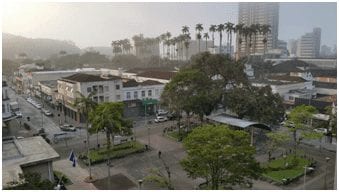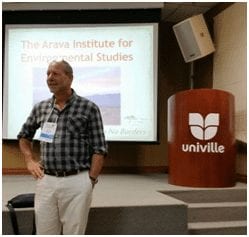A few months ago, I was contacted by a representative from the Israeli Trade Delegation in São Paulo, Brazil. I was asked if I would be willing to represent Israel at the 6th Santa Catarina State Workshop on Geographical Indication and Exhibition of Traditional Products. The workshop connected agriculture to the preservation of traditional cultures in Brazil and to the environment. I will admit that I was not completely clear what Geographical Indications are, nor was I clear why I was being invited, but I was being offered an opportunity to visit Brazil for the first time in my life. This would also be my first visit to South America. The Institute has hosted numerous South American students and interns in the past few years so this seemed like a good opportunity to get a better understanding of Latin American and perhaps develop academic ties with institutions in Brazil.
I left for Joinville, Santa Catarina, the city in Brazil which is home to Univille University, the host of the Workshop on Geographical Indication on Saturday, on August 5th, and after a 3 hour drive to Ben-Gurion Airport, 3 flights through Madrid, São Paulo, to Curitiba, and then another 2 hour drive from Curitiba I and the other three guest speakers from Portugal, Poland and France, arrived in Joinville to our hotel on Sunday, August 6th, 30 hours later.

During my week long stay, I learned a great deal about Brazil and its amazingly rich culture. Brazil is a very large country (almost the size of the United States) with a population of about 210 million people. The country is divided into States, each one with its own culture, economy and natural resources. I was hosted in the State of Santa Catarina (SC) in the south of Brazil, which has a distinctly European feel because it was originally settled by Germans and subsequently populated by immigrants from Italy, Poland and other European countries. The Workshop was held in Joinville, the largest city in SC, with almost 600 thousand residents. SC is the third richest state in Brazil with a bustling economy, an abundance of commercial activities, stores, restaurants and industry. It was not how I had pictured South America and my hosts agreed that SC was exceptional in that not all of Brazil was as developed, especially in some of the northern states. In general however, Brazil seems to be a developed country which affords most of its citizens, economic opportunities, “western” comforts, safety and security. Like most developed countries today however, there are still large pockets of poverty, inequality and injustice within its borders but these were not so overt in SC. The thing I found most interesting is that due to its colonial and immigrant history, Santa Catarina is a very diverse region with ethnic groups representing indigenous peoples, immigrants from many countries in Europe and Africa, and yet there did not seem to be much sectarian tensions though large economic gaps still exist. There appears to be no predisposition to Israel or to the political conflict between Palestinians and Israelis. The other thing I learned very quickly is that on the whole, Brazilians do not speak English.
The first few days in Santa Catarina were spent exploring and touring and included a visit to Florianópolis, the state capital. Florianópolis, on the east coast of Brazil, though smaller than Joinville, is the location of the headquarters of Epagri, the State Agriculture Department and a central sponsor of the Santa Catarina Workshop. Florianópolis is located about a 3 hour drive to the south of Joinville. Though Florianópolis is about half the population size of Joinville, it is much more compact and urban with lots of skyscrapers scrunched together on a series of island connected by human made and natural land bridges. We spent the morning attending a seminar on Geographical Indications at the Agricultural Department. This was a kind of pre-conference gathering. The seminar was entirely in Portuguese, a language of which I had zero knowledge prior to the trip. Fortunately, most of the lectures were accompanied by slides and though also in Portuguese, due to the similarity between many English and Portuguese words, possible to follow together with support from Google Translate. After the seminar at Epargri headquarters we toured some of the beautiful colonial neighborhoods around Florianópolis.

After that final meeting we headed back to the hotel. In the evening, the organizers treated the guest speakers to a real Brazilian barbeque with sausages, ribs, steaks, beer and Bossa nova music. If I had not had to get up early the next morning for my flights home, I believe we would have been there all night.

Bottom left to right: Alberto de Almeida, Miguel da Silva, Suelen Carls
and Joanna Marszalek
On Saturday morning, after saying goodbye to the organizing committee and my fellow guest speakers, I began my 4 flight, two day journey home. I look forward to my next visit to Brazil and to future opportunities to engage the Arava Institute with communities around the world.
David Lehrer

